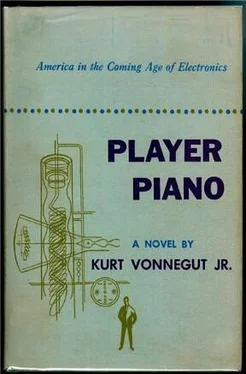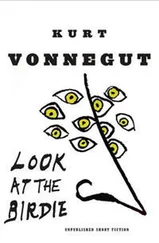Garth looked out of the window abstractedly. "It is, isn't it. God smiles on the Meadows."
"Probably did before we occupied it."
"I didn't make that up."
"Make what up?"
"About God smiling. That's from Doctor Gelhorne, of course. Remember? He said that last year on the closing day."
"Yep." Doctor Gelhorne said so many memorable things, it was hard for a person to stow them all away in his treasure house of souvenirs.
"Lunch!" said the loudspeakers. "Lunch! Remember the rule: get to know somebody new at each meal. Have your buddy on one side, but a stranger on the other. Lunch! Lunch!" Irrelevantly, the speakers blared "Oh How I Hate to Get Up in the Morning." Paul and Garth and five hundred other pairs walked across the parade ground to the dining hall.
As the crowd bore Paul and his buddy through the swinging screen doors, Kroner caught his arm and drew him to one side. Garth, like the good buddy he wanted to be, stepped out of line and waited.
"Tomorrow night," said Kroner. "The big meeting is tomorrow night - after the keynote play and bonfire."
"Fine."
"I told you the Old Man himself is coming. It's going to be that important. You're going to be that important. I don't quite know what's up, but I've a hunch it's going to be the biggest thing in your career."
"Gosh."
"Don't worry. With the blood you've got in your veins, you've got more than what it'll take to do the job - whatever it is."
"Thanks."
Paul got back in line with Garth. "He certainly likes you, doesn't he?" said Garth.
"Old friend of my father's. Said it was good to have me aboard."
"Oh." Garth looked a little embarrassed. Paul's bald lie had pointed up for the first time their competitive situation. He let the lie pass. Shepherd would have hounded Paul, and, more subtly, Kroner, until he'd learned every word that had passed between them.
Paul felt real warmth for Garth. "Come on, buddy, let's find a couple of strangers."
"It's going to be tough. We've been around a long time, Paul."
"Look for some apple-cheeked youngster fresh out of school."
"There's one."
"Berringer!" said Paul, amazed. When the machines had made a list of Ilium men eligible for the Meadows, Berringer's card had stayed in its slot. He was the last man in the whole Works who deserved an invitation. Yet, here he was.
Berringer seemed to know what was going through Paul's head, and he returned Paul's gaze with an insolent smile.
Baer stepped between them. "Forgot, forgot - supposed to tell you," he said. "Berringer, about Berringer. Kroner said to tell you, and I forgot, forgot."
"How the hell did he get up here?"
"Kroner brought him up. Last minute thing, see? Hmm? Kroner thought it'd break his father's heart if the boy wasn't asked, and after what happened to Checker Charley and all."
"There goes the merit system," said Paul.
Baer nodded. "Yep - there it goes, there it goes, all right." He shrugged and raised his eyebrows quizzically. "Zip zip, out the window."
Paul reflected that Baer was possibly the most just, reasonable, and candid person he'd ever known - remarkably machine-like in that the only problems he interested himself in were those brought to him, and in that he went to work on all problems with equal energy and interest, insensitive to quality and scale.
Paul glanced once more at Berringer, saw his luncheon companion was Shepherd and that his shirt was green, and forgot about him.
He and Garth finally found a pair of very young strangers with two empty seats between them, and sat down.
The redheaded youngster next to Paul looked at his badge. "Oh, Doctor Proteus. I've heard of you. How are you, sir?"
"Paul, not Doctor. Fine, how are you - " he studied his companion's badge "Doctor Edmund L. Harrison, of the Ithaca Works?"
"Get to know the man next to you," said the loudspeaker. "Don't talk to anyone you know."
"Married?" said Paul.
"That's what you're here for, to get to know new people, to broaden your horizons," said the loudspeaker.
"Nossir, I'm en -"
"The more contacts you make here at the Meadows," said the loudspeaker, "the more smoothly industry will function, co-operationwise."
"I'm engaged," said Doctor Harrison.
"An Ithaca girl?"
"Two seats right over here, gentlemen - over in the corner. Right over there. Let's get our seats quickly, because there's a full program, and everybody wants to get down to knowing everybody else," said the loudspeaker.
"Nossir," said Doctor Harrison. "Atlanta." He looked at Paul's badge again. "Aren't you the son of -"
"Now that we're all seated and getting to know one another, how about a little song to pull us all together?" said the loudspeaker.
"Yes, he was my father," said Paul.
"Turn to page twenty-eight of the Song Book ," said the loudspeaker. "Twenty-eight, twenty-eight!"
"He was quite a man," said Harrison.
"Yes," said Paul.
" 'Wait Till the Sun Shines, Nellie!' " shouted the loudspeaker. "Find it? Twenty-eight! All right, now, let's go!"
The band at the far end of the hall, amplified to the din of an elephant charge, smashed and hewed at the tune as though in a holy war against silence. It was impossible even to be cordial to oneself in the midst of the uproar. Paul's stomach knotted and his tastebuds went dead, and the delicious, expensive food went down his gullet like boiled horsemeat and hominy grits.
"Paul, Paul, Paul, oh Paul!" shouted Baer from across the table. "Paul!"
"What?"
"That's you - you they're calling for; they're calling for you!"
"Don't tell me the captain of the Blue Team is such a coward he ran out at the last minute," the loudspeaker was saying sarcastically. "Come on! Where's that Blue captain?"
Paul stood, and held up his hand. "Here," he said in a voice inaudible even to himself.
Cheers and boos greeted him, in a proportion of one to three. He was pelted by wadded paper napkins and maraschino cherries from the tops of salads.
"Well," said the loudspeaker tauntingly, "let's hear your song."
Hands gripped Paul and hoisted him into the air, and he was borne down the aisle toward the bandstand by a flying wedge of blue-shirted men. They dumped him on the bandstand and formed a cordon about him. The master of ceremonies, a fat, red old man with breasts like a woman's sticking through his wet T-shirt, thrust a Song Book into his hands. The band blasted out the fight song of the Blue Team.
"Oh you Blue Team, you tried and true team," said Paul. His voice came back at him, strange and frightening, amplified electronically to fierce defiance and determination. "There are no teams as good as you!"
At this point he was completely drowned out by the stamping of feet, whistles, catcalls, and the clank of spoons on glasses. The master of ceremonies, delighted with the high spirits he was evoking, handed Paul a blue banner to wave. No sooner were Paul's hands on the staff than he saw the ranks of his protectors split wide open. Berringer, his head lowered, his thick legs driving, charged him.
In the scuffle, Paul swung at the informality-maddened Berringer, missed, and was knocked, hors de combat , off the bandstand and halfway through the kitchen doors.
"Please! Please!" the loudspeaker was pleading. "There are very few rules at the Meadows, but the few that there are must be observed! Get back to your seat, now, you in the green shirt. There's to be no rough stuff indoors. Do you understand?"
Laughter was general.
"One more outburst like this one, and you'll be asked to leave the island!"
Kind hands picked up Paul, and he found himself looking into the grave, dull face of Luke Lubbock, the perennial joiner, who wore a busboy's uniform. One of the cooks, who had been watching with disdain, turned away quickly when Paul looked at him, and disappeared into the big meat locker.
Читать дальше








![Курт Воннегут - Вампитеры, фома и гранфаллоны [litres]](/books/397997/kurt-vonnegut-vampitery-foma-i-granfallony-litre-thumb.webp)